Hospitality Business Toolkit Report: Everland Wish Analysis
VerifiedAdded on 2021/01/01
|20
|4377
|342
Report
AI Summary
This report provides a comprehensive analysis of the Everland Wish hospitality business, a London-based restaurant specializing in salads, smoothies, and blended juices. It begins with an introduction to the hospitality industry and the specific context of Everland Wish. Task 1 focuses on financial aspects, including recording income and expenditures, explaining key financial terms (sales, purchases, types of costs), implementing a double-entry bookkeeping system, and constructing a basic trial balance. Task 2 delves into human resources, examining the HR life cycle stages (recruitment, interview, induction, performance review, learning and development, promotion, and exit) and their importance in talent management and staff retention. It also provides judgments and recommendations for improving HR processes. Task 3 covers relevant legislation that hospitality organizations must adhere to, illustrating potential impacts on business decision-making. Task 4 explores different functional roles, communication methods, coordination, and monitoring techniques within hospitality, and analyzes their impact on achieving organizational objectives and strengthening value chains, offering recommendations for improvement. The report concludes with a summary of the key findings and provides references.
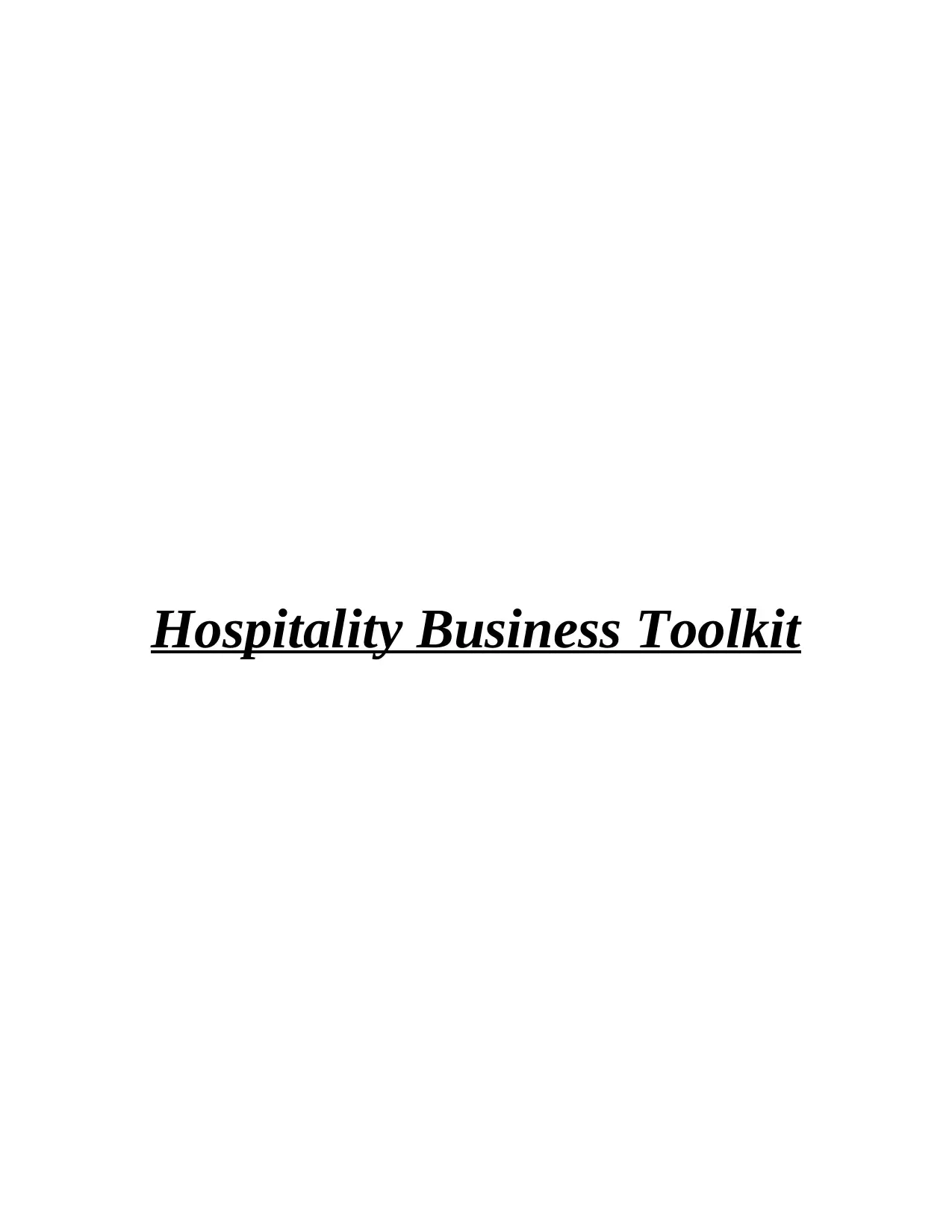
Hospitality Business Toolkit
Paraphrase This Document
Need a fresh take? Get an instant paraphrase of this document with our AI Paraphraser
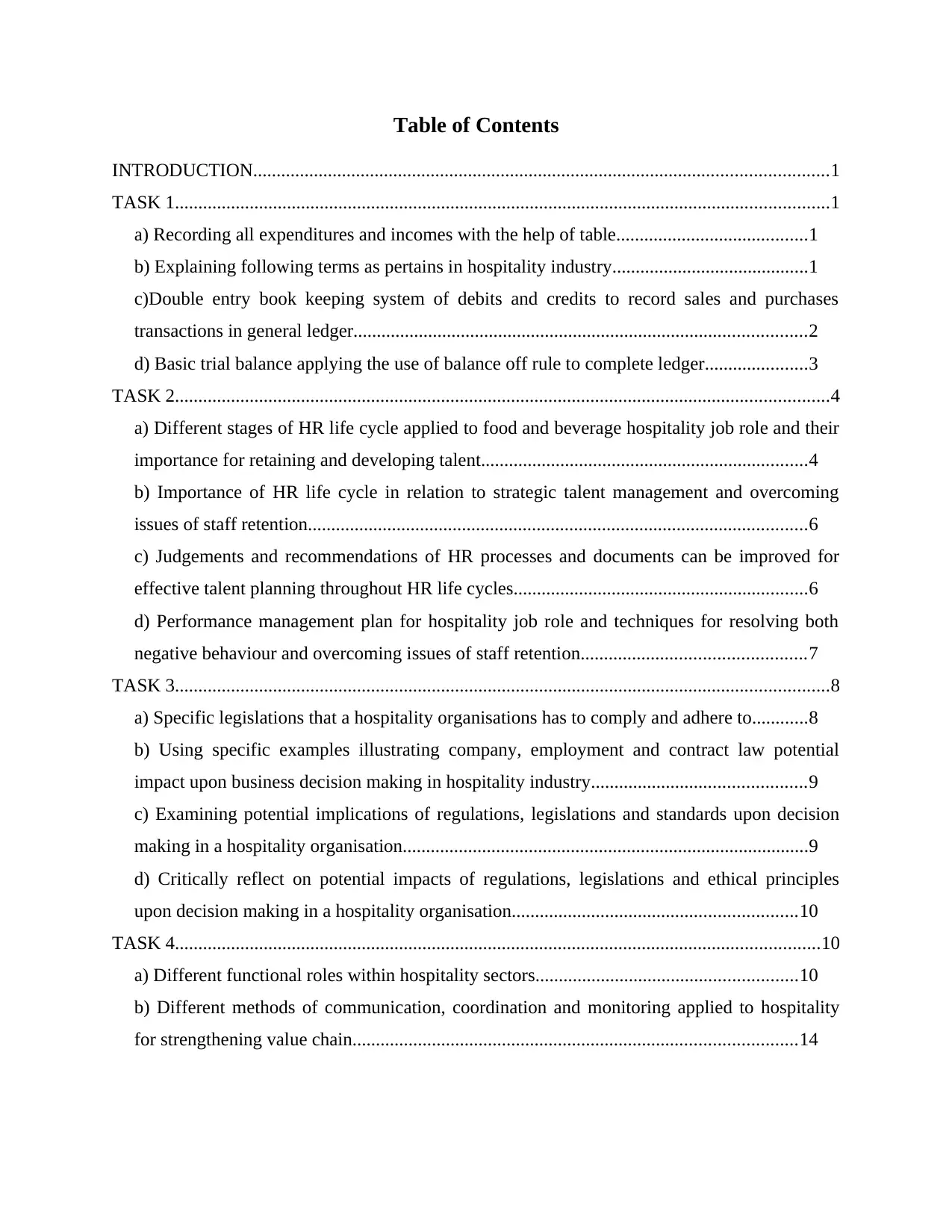
Table of Contents
INTRODUCTION...........................................................................................................................1
TASK 1............................................................................................................................................1
a) Recording all expenditures and incomes with the help of table.........................................1
b) Explaining following terms as pertains in hospitality industry..........................................1
c)Double entry book keeping system of debits and credits to record sales and purchases
transactions in general ledger.................................................................................................2
d) Basic trial balance applying the use of balance off rule to complete ledger......................3
TASK 2............................................................................................................................................4
a) Different stages of HR life cycle applied to food and beverage hospitality job role and their
importance for retaining and developing talent......................................................................4
b) Importance of HR life cycle in relation to strategic talent management and overcoming
issues of staff retention...........................................................................................................6
c) Judgements and recommendations of HR processes and documents can be improved for
effective talent planning throughout HR life cycles...............................................................6
d) Performance management plan for hospitality job role and techniques for resolving both
negative behaviour and overcoming issues of staff retention................................................7
TASK 3............................................................................................................................................8
a) Specific legislations that a hospitality organisations has to comply and adhere to............8
b) Using specific examples illustrating company, employment and contract law potential
impact upon business decision making in hospitality industry..............................................9
c) Examining potential implications of regulations, legislations and standards upon decision
making in a hospitality organisation.......................................................................................9
d) Critically reflect on potential impacts of regulations, legislations and ethical principles
upon decision making in a hospitality organisation.............................................................10
TASK 4..........................................................................................................................................10
a) Different functional roles within hospitality sectors........................................................10
b) Different methods of communication, coordination and monitoring applied to hospitality
for strengthening value chain...............................................................................................14
INTRODUCTION...........................................................................................................................1
TASK 1............................................................................................................................................1
a) Recording all expenditures and incomes with the help of table.........................................1
b) Explaining following terms as pertains in hospitality industry..........................................1
c)Double entry book keeping system of debits and credits to record sales and purchases
transactions in general ledger.................................................................................................2
d) Basic trial balance applying the use of balance off rule to complete ledger......................3
TASK 2............................................................................................................................................4
a) Different stages of HR life cycle applied to food and beverage hospitality job role and their
importance for retaining and developing talent......................................................................4
b) Importance of HR life cycle in relation to strategic talent management and overcoming
issues of staff retention...........................................................................................................6
c) Judgements and recommendations of HR processes and documents can be improved for
effective talent planning throughout HR life cycles...............................................................6
d) Performance management plan for hospitality job role and techniques for resolving both
negative behaviour and overcoming issues of staff retention................................................7
TASK 3............................................................................................................................................8
a) Specific legislations that a hospitality organisations has to comply and adhere to............8
b) Using specific examples illustrating company, employment and contract law potential
impact upon business decision making in hospitality industry..............................................9
c) Examining potential implications of regulations, legislations and standards upon decision
making in a hospitality organisation.......................................................................................9
d) Critically reflect on potential impacts of regulations, legislations and ethical principles
upon decision making in a hospitality organisation.............................................................10
TASK 4..........................................................................................................................................10
a) Different functional roles within hospitality sectors........................................................10
b) Different methods of communication, coordination and monitoring applied to hospitality
for strengthening value chain...............................................................................................14
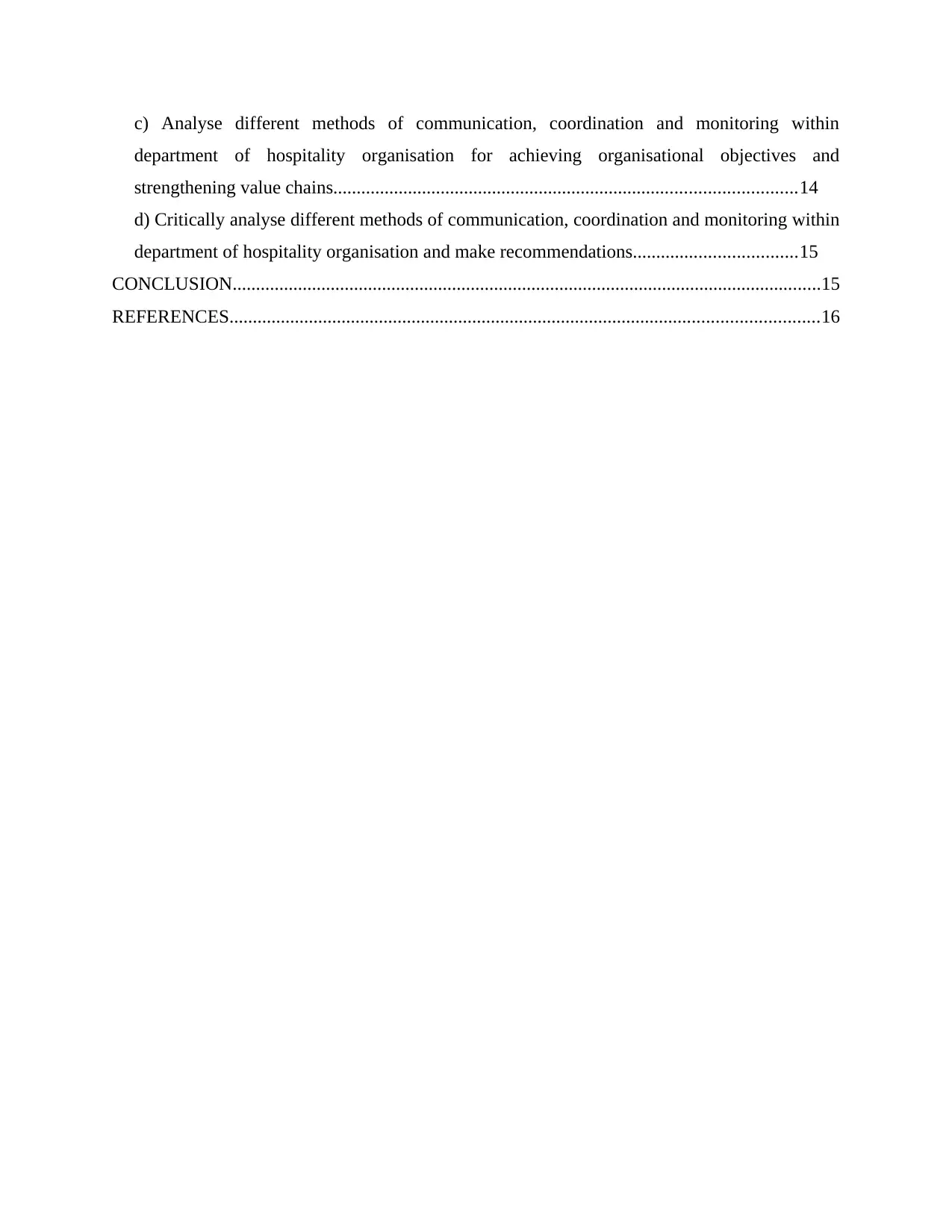
c) Analyse different methods of communication, coordination and monitoring within
department of hospitality organisation for achieving organisational objectives and
strengthening value chains...................................................................................................14
d) Critically analyse different methods of communication, coordination and monitoring within
department of hospitality organisation and make recommendations...................................15
CONCLUSION..............................................................................................................................15
REFERENCES..............................................................................................................................16
department of hospitality organisation for achieving organisational objectives and
strengthening value chains...................................................................................................14
d) Critically analyse different methods of communication, coordination and monitoring within
department of hospitality organisation and make recommendations...................................15
CONCLUSION..............................................................................................................................15
REFERENCES..............................................................................................................................16
⊘ This is a preview!⊘
Do you want full access?
Subscribe today to unlock all pages.

Trusted by 1+ million students worldwide

Paraphrase This Document
Need a fresh take? Get an instant paraphrase of this document with our AI Paraphraser
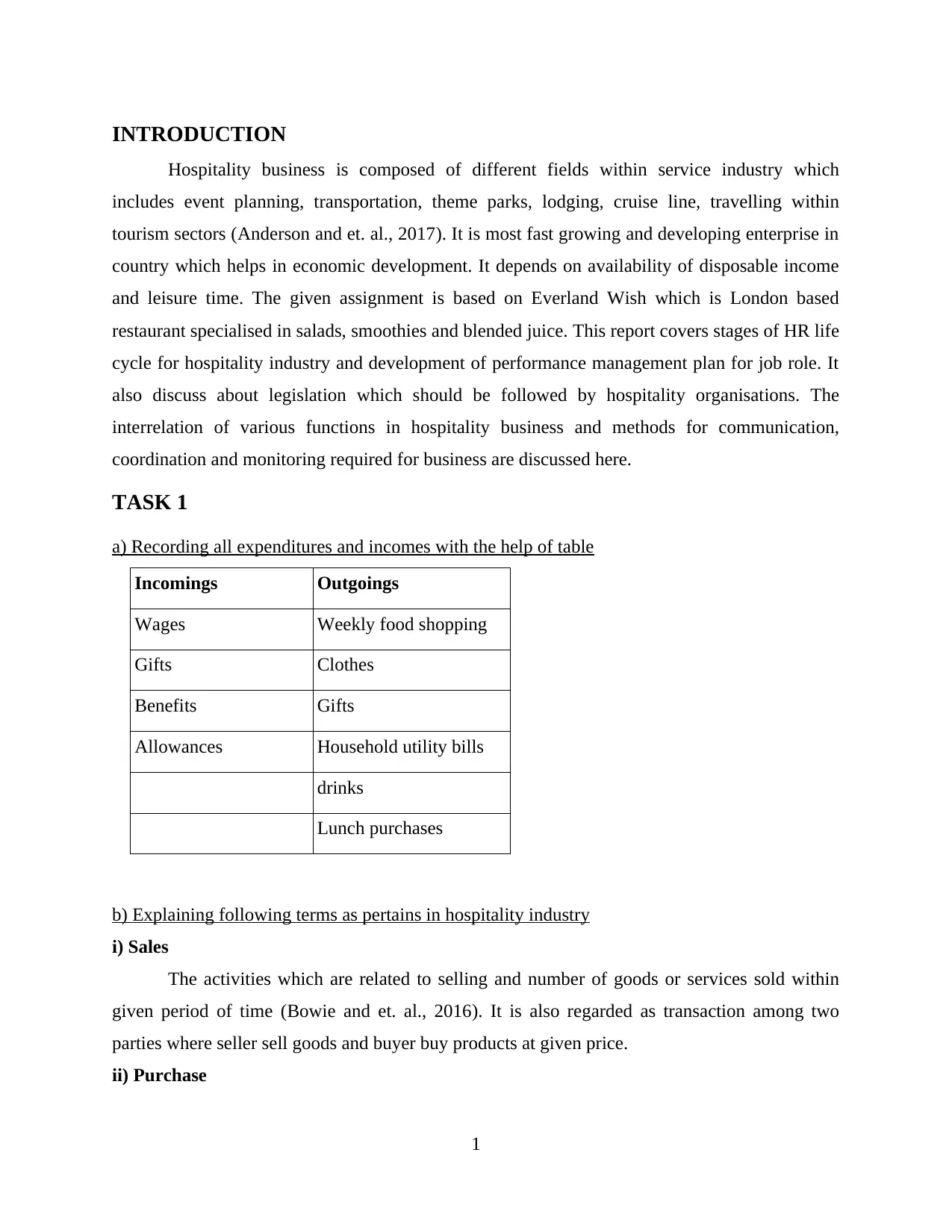
INTRODUCTION
Hospitality business is composed of different fields within service industry which
includes event planning, transportation, theme parks, lodging, cruise line, travelling within
tourism sectors (Anderson and et. al., 2017). It is most fast growing and developing enterprise in
country which helps in economic development. It depends on availability of disposable income
and leisure time. The given assignment is based on Everland Wish which is London based
restaurant specialised in salads, smoothies and blended juice. This report covers stages of HR life
cycle for hospitality industry and development of performance management plan for job role. It
also discuss about legislation which should be followed by hospitality organisations. The
interrelation of various functions in hospitality business and methods for communication,
coordination and monitoring required for business are discussed here.
TASK 1
a) Recording all expenditures and incomes with the help of table
Incomings Outgoings
Wages Weekly food shopping
Gifts Clothes
Benefits Gifts
Allowances Household utility bills
drinks
Lunch purchases
b) Explaining following terms as pertains in hospitality industry
i) Sales
The activities which are related to selling and number of goods or services sold within
given period of time (Bowie and et. al., 2016). It is also regarded as transaction among two
parties where seller sell goods and buyer buy products at given price.
ii) Purchase
1
Hospitality business is composed of different fields within service industry which
includes event planning, transportation, theme parks, lodging, cruise line, travelling within
tourism sectors (Anderson and et. al., 2017). It is most fast growing and developing enterprise in
country which helps in economic development. It depends on availability of disposable income
and leisure time. The given assignment is based on Everland Wish which is London based
restaurant specialised in salads, smoothies and blended juice. This report covers stages of HR life
cycle for hospitality industry and development of performance management plan for job role. It
also discuss about legislation which should be followed by hospitality organisations. The
interrelation of various functions in hospitality business and methods for communication,
coordination and monitoring required for business are discussed here.
TASK 1
a) Recording all expenditures and incomes with the help of table
Incomings Outgoings
Wages Weekly food shopping
Gifts Clothes
Benefits Gifts
Allowances Household utility bills
drinks
Lunch purchases
b) Explaining following terms as pertains in hospitality industry
i) Sales
The activities which are related to selling and number of goods or services sold within
given period of time (Bowie and et. al., 2016). It is also regarded as transaction among two
parties where seller sell goods and buyer buy products at given price.
ii) Purchase
1
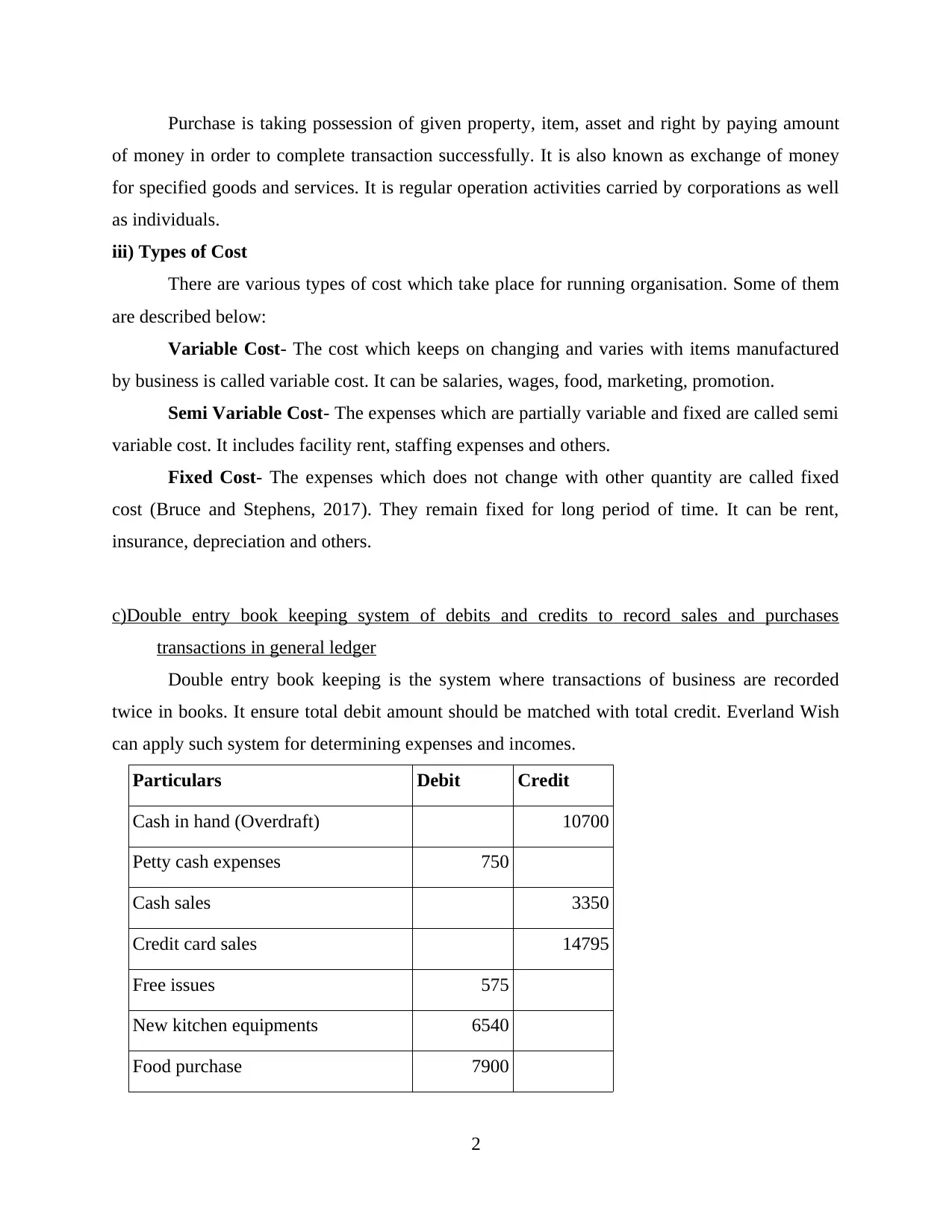
Purchase is taking possession of given property, item, asset and right by paying amount
of money in order to complete transaction successfully. It is also known as exchange of money
for specified goods and services. It is regular operation activities carried by corporations as well
as individuals.
iii) Types of Cost
There are various types of cost which take place for running organisation. Some of them
are described below:
Variable Cost- The cost which keeps on changing and varies with items manufactured
by business is called variable cost. It can be salaries, wages, food, marketing, promotion.
Semi Variable Cost- The expenses which are partially variable and fixed are called semi
variable cost. It includes facility rent, staffing expenses and others.
Fixed Cost- The expenses which does not change with other quantity are called fixed
cost (Bruce and Stephens, 2017). They remain fixed for long period of time. It can be rent,
insurance, depreciation and others.
c)Double entry book keeping system of debits and credits to record sales and purchases
transactions in general ledger
Double entry book keeping is the system where transactions of business are recorded
twice in books. It ensure total debit amount should be matched with total credit. Everland Wish
can apply such system for determining expenses and incomes.
Particulars Debit Credit
Cash in hand (Overdraft) 10700
Petty cash expenses 750
Cash sales 3350
Credit card sales 14795
Free issues 575
New kitchen equipments 6540
Food purchase 7900
2
of money in order to complete transaction successfully. It is also known as exchange of money
for specified goods and services. It is regular operation activities carried by corporations as well
as individuals.
iii) Types of Cost
There are various types of cost which take place for running organisation. Some of them
are described below:
Variable Cost- The cost which keeps on changing and varies with items manufactured
by business is called variable cost. It can be salaries, wages, food, marketing, promotion.
Semi Variable Cost- The expenses which are partially variable and fixed are called semi
variable cost. It includes facility rent, staffing expenses and others.
Fixed Cost- The expenses which does not change with other quantity are called fixed
cost (Bruce and Stephens, 2017). They remain fixed for long period of time. It can be rent,
insurance, depreciation and others.
c)Double entry book keeping system of debits and credits to record sales and purchases
transactions in general ledger
Double entry book keeping is the system where transactions of business are recorded
twice in books. It ensure total debit amount should be matched with total credit. Everland Wish
can apply such system for determining expenses and incomes.
Particulars Debit Credit
Cash in hand (Overdraft) 10700
Petty cash expenses 750
Cash sales 3350
Credit card sales 14795
Free issues 575
New kitchen equipments 6540
Food purchase 7900
2
⊘ This is a preview!⊘
Do you want full access?
Subscribe today to unlock all pages.

Trusted by 1+ million students worldwide
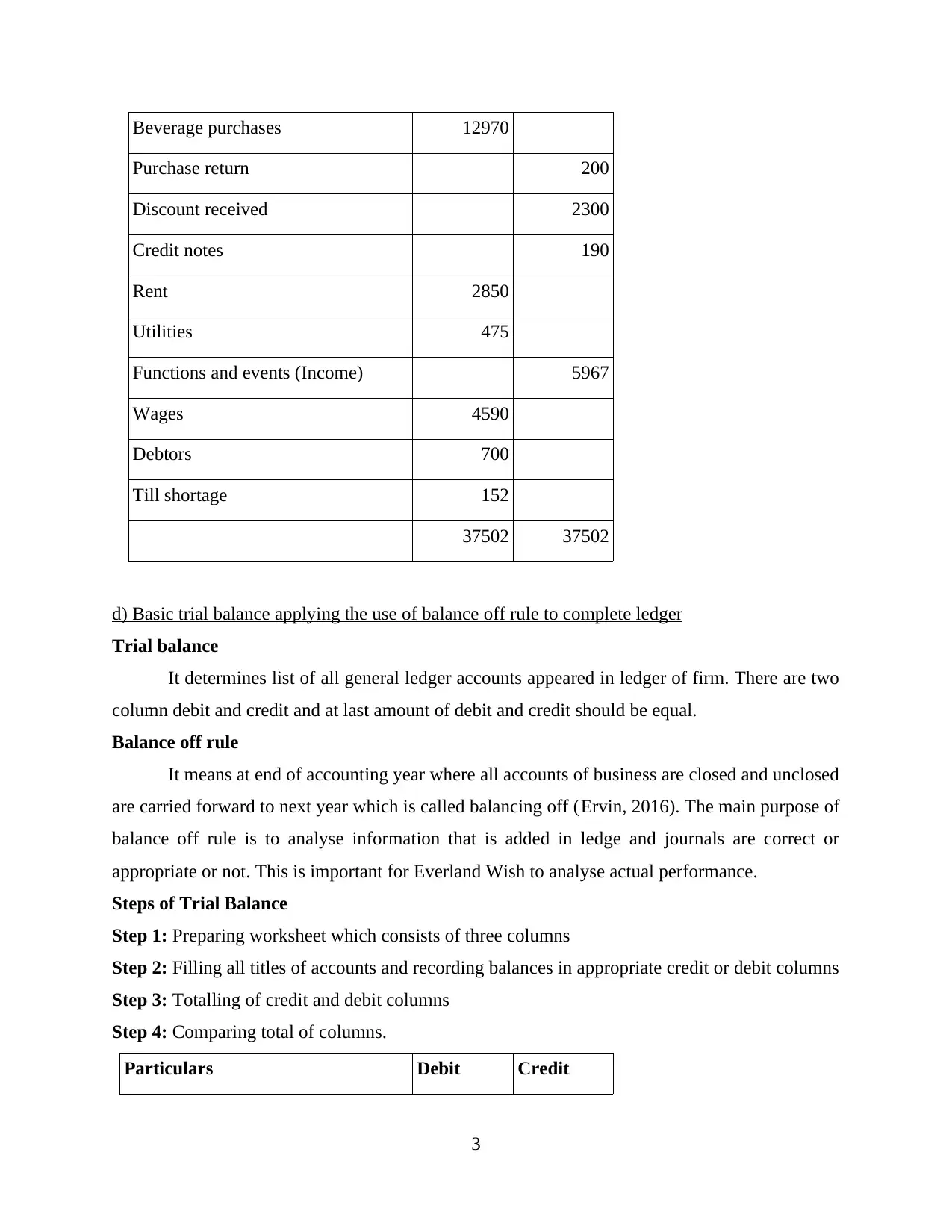
Beverage purchases 12970
Purchase return 200
Discount received 2300
Credit notes 190
Rent 2850
Utilities 475
Functions and events (Income) 5967
Wages 4590
Debtors 700
Till shortage 152
37502 37502
d) Basic trial balance applying the use of balance off rule to complete ledger
Trial balance
It determines list of all general ledger accounts appeared in ledger of firm. There are two
column debit and credit and at last amount of debit and credit should be equal.
Balance off rule
It means at end of accounting year where all accounts of business are closed and unclosed
are carried forward to next year which is called balancing off (Ervin, 2016). The main purpose of
balance off rule is to analyse information that is added in ledge and journals are correct or
appropriate or not. This is important for Everland Wish to analyse actual performance.
Steps of Trial Balance
Step 1: Preparing worksheet which consists of three columns
Step 2: Filling all titles of accounts and recording balances in appropriate credit or debit columns
Step 3: Totalling of credit and debit columns
Step 4: Comparing total of columns.
Particulars Debit Credit
3
Purchase return 200
Discount received 2300
Credit notes 190
Rent 2850
Utilities 475
Functions and events (Income) 5967
Wages 4590
Debtors 700
Till shortage 152
37502 37502
d) Basic trial balance applying the use of balance off rule to complete ledger
Trial balance
It determines list of all general ledger accounts appeared in ledger of firm. There are two
column debit and credit and at last amount of debit and credit should be equal.
Balance off rule
It means at end of accounting year where all accounts of business are closed and unclosed
are carried forward to next year which is called balancing off (Ervin, 2016). The main purpose of
balance off rule is to analyse information that is added in ledge and journals are correct or
appropriate or not. This is important for Everland Wish to analyse actual performance.
Steps of Trial Balance
Step 1: Preparing worksheet which consists of three columns
Step 2: Filling all titles of accounts and recording balances in appropriate credit or debit columns
Step 3: Totalling of credit and debit columns
Step 4: Comparing total of columns.
Particulars Debit Credit
3
Paraphrase This Document
Need a fresh take? Get an instant paraphrase of this document with our AI Paraphraser
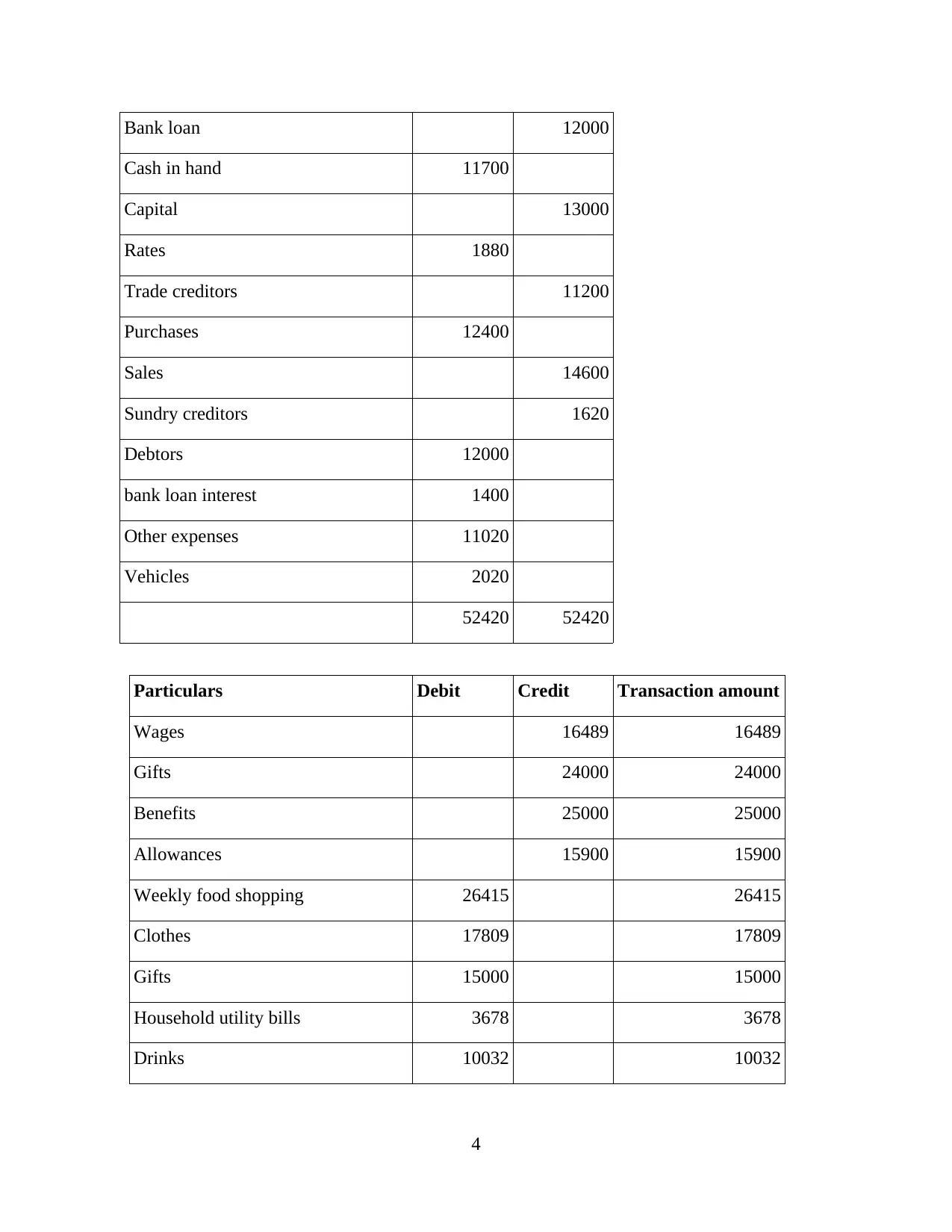
Bank loan 12000
Cash in hand 11700
Capital 13000
Rates 1880
Trade creditors 11200
Purchases 12400
Sales 14600
Sundry creditors 1620
Debtors 12000
bank loan interest 1400
Other expenses 11020
Vehicles 2020
52420 52420
Particulars Debit Credit Transaction amount
Wages 16489 16489
Gifts 24000 24000
Benefits 25000 25000
Allowances 15900 15900
Weekly food shopping 26415 26415
Clothes 17809 17809
Gifts 15000 15000
Household utility bills 3678 3678
Drinks 10032 10032
4
Cash in hand 11700
Capital 13000
Rates 1880
Trade creditors 11200
Purchases 12400
Sales 14600
Sundry creditors 1620
Debtors 12000
bank loan interest 1400
Other expenses 11020
Vehicles 2020
52420 52420
Particulars Debit Credit Transaction amount
Wages 16489 16489
Gifts 24000 24000
Benefits 25000 25000
Allowances 15900 15900
Weekly food shopping 26415 26415
Clothes 17809 17809
Gifts 15000 15000
Household utility bills 3678 3678
Drinks 10032 10032
4
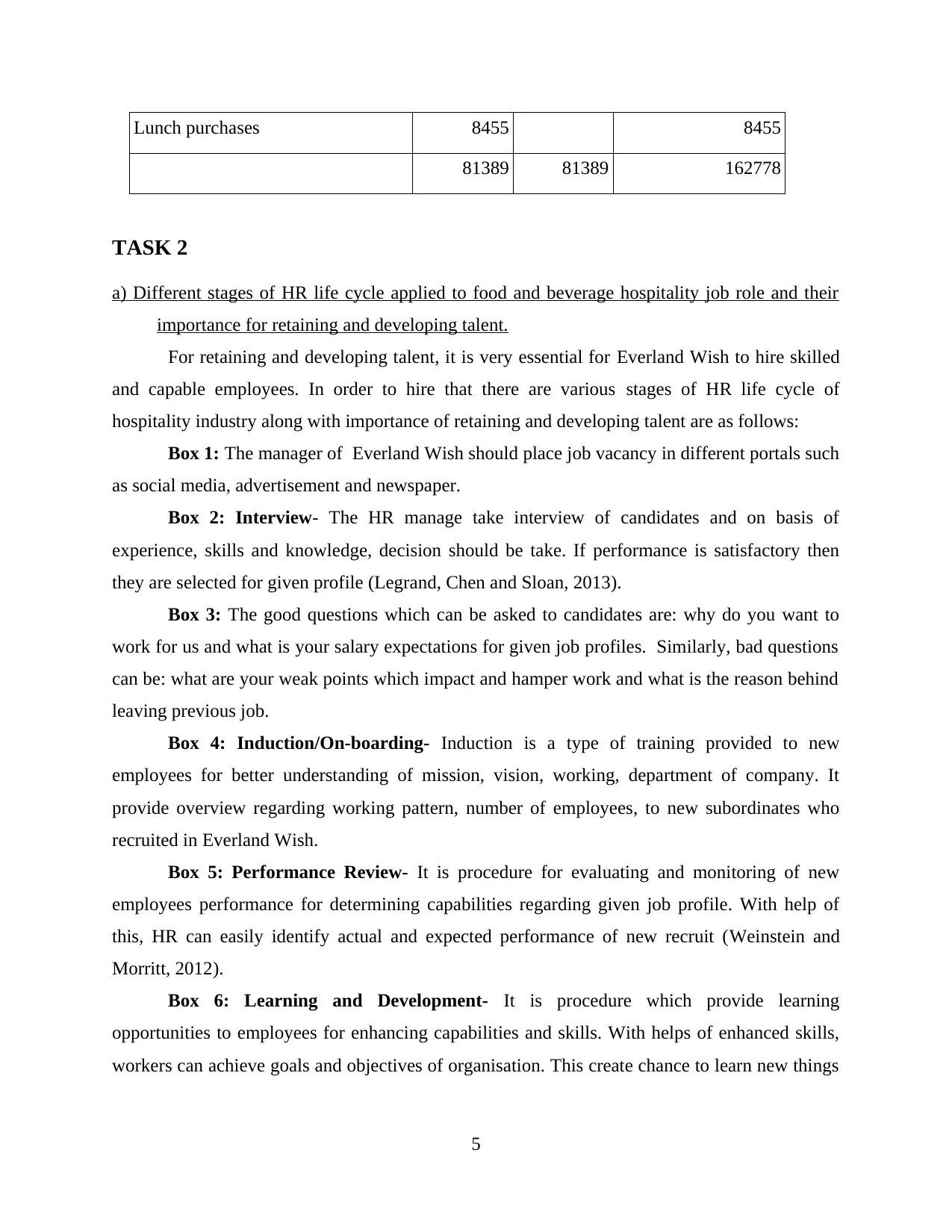
Lunch purchases 8455 8455
81389 81389 162778
TASK 2
a) Different stages of HR life cycle applied to food and beverage hospitality job role and their
importance for retaining and developing talent.
For retaining and developing talent, it is very essential for Everland Wish to hire skilled
and capable employees. In order to hire that there are various stages of HR life cycle of
hospitality industry along with importance of retaining and developing talent are as follows:
Box 1: The manager of Everland Wish should place job vacancy in different portals such
as social media, advertisement and newspaper.
Box 2: Interview- The HR manage take interview of candidates and on basis of
experience, skills and knowledge, decision should be take. If performance is satisfactory then
they are selected for given profile (Legrand, Chen and Sloan, 2013).
Box 3: The good questions which can be asked to candidates are: why do you want to
work for us and what is your salary expectations for given job profiles. Similarly, bad questions
can be: what are your weak points which impact and hamper work and what is the reason behind
leaving previous job.
Box 4: Induction/On-boarding- Induction is a type of training provided to new
employees for better understanding of mission, vision, working, department of company. It
provide overview regarding working pattern, number of employees, to new subordinates who
recruited in Everland Wish.
Box 5: Performance Review- It is procedure for evaluating and monitoring of new
employees performance for determining capabilities regarding given job profile. With help of
this, HR can easily identify actual and expected performance of new recruit (Weinstein and
Morritt, 2012).
Box 6: Learning and Development- It is procedure which provide learning
opportunities to employees for enhancing capabilities and skills. With helps of enhanced skills,
workers can achieve goals and objectives of organisation. This create chance to learn new things
5
81389 81389 162778
TASK 2
a) Different stages of HR life cycle applied to food and beverage hospitality job role and their
importance for retaining and developing talent.
For retaining and developing talent, it is very essential for Everland Wish to hire skilled
and capable employees. In order to hire that there are various stages of HR life cycle of
hospitality industry along with importance of retaining and developing talent are as follows:
Box 1: The manager of Everland Wish should place job vacancy in different portals such
as social media, advertisement and newspaper.
Box 2: Interview- The HR manage take interview of candidates and on basis of
experience, skills and knowledge, decision should be take. If performance is satisfactory then
they are selected for given profile (Legrand, Chen and Sloan, 2013).
Box 3: The good questions which can be asked to candidates are: why do you want to
work for us and what is your salary expectations for given job profiles. Similarly, bad questions
can be: what are your weak points which impact and hamper work and what is the reason behind
leaving previous job.
Box 4: Induction/On-boarding- Induction is a type of training provided to new
employees for better understanding of mission, vision, working, department of company. It
provide overview regarding working pattern, number of employees, to new subordinates who
recruited in Everland Wish.
Box 5: Performance Review- It is procedure for evaluating and monitoring of new
employees performance for determining capabilities regarding given job profile. With help of
this, HR can easily identify actual and expected performance of new recruit (Weinstein and
Morritt, 2012).
Box 6: Learning and Development- It is procedure which provide learning
opportunities to employees for enhancing capabilities and skills. With helps of enhanced skills,
workers can achieve goals and objectives of organisation. This create chance to learn new things
5
⊘ This is a preview!⊘
Do you want full access?
Subscribe today to unlock all pages.

Trusted by 1+ million students worldwide
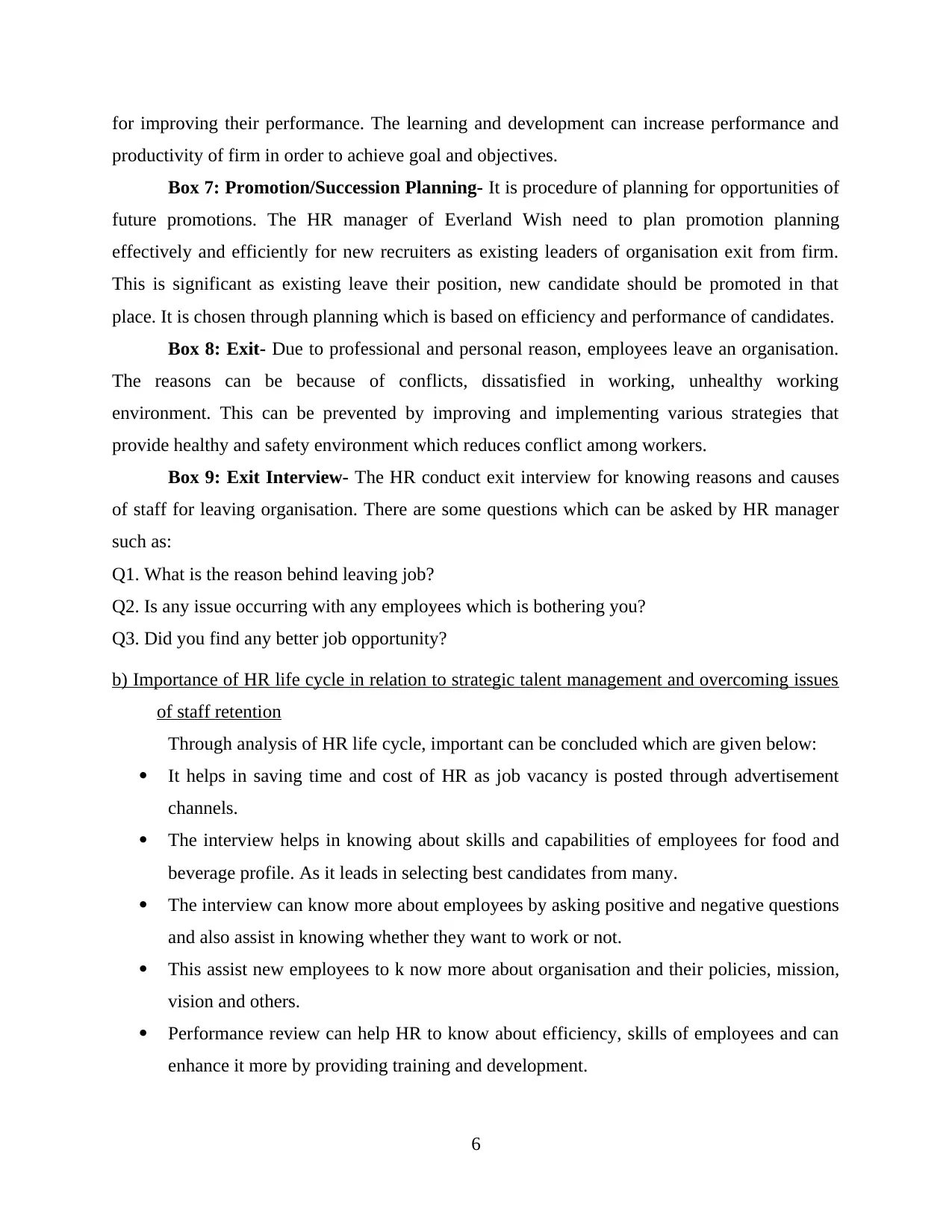
for improving their performance. The learning and development can increase performance and
productivity of firm in order to achieve goal and objectives.
Box 7: Promotion/Succession Planning- It is procedure of planning for opportunities of
future promotions. The HR manager of Everland Wish need to plan promotion planning
effectively and efficiently for new recruiters as existing leaders of organisation exit from firm.
This is significant as existing leave their position, new candidate should be promoted in that
place. It is chosen through planning which is based on efficiency and performance of candidates.
Box 8: Exit- Due to professional and personal reason, employees leave an organisation.
The reasons can be because of conflicts, dissatisfied in working, unhealthy working
environment. This can be prevented by improving and implementing various strategies that
provide healthy and safety environment which reduces conflict among workers.
Box 9: Exit Interview- The HR conduct exit interview for knowing reasons and causes
of staff for leaving organisation. There are some questions which can be asked by HR manager
such as:
Q1. What is the reason behind leaving job?
Q2. Is any issue occurring with any employees which is bothering you?
Q3. Did you find any better job opportunity?
b) Importance of HR life cycle in relation to strategic talent management and overcoming issues
of staff retention
Through analysis of HR life cycle, important can be concluded which are given below:
It helps in saving time and cost of HR as job vacancy is posted through advertisement
channels.
The interview helps in knowing about skills and capabilities of employees for food and
beverage profile. As it leads in selecting best candidates from many.
The interview can know more about employees by asking positive and negative questions
and also assist in knowing whether they want to work or not.
This assist new employees to k now more about organisation and their policies, mission,
vision and others.
Performance review can help HR to know about efficiency, skills of employees and can
enhance it more by providing training and development.
6
productivity of firm in order to achieve goal and objectives.
Box 7: Promotion/Succession Planning- It is procedure of planning for opportunities of
future promotions. The HR manager of Everland Wish need to plan promotion planning
effectively and efficiently for new recruiters as existing leaders of organisation exit from firm.
This is significant as existing leave their position, new candidate should be promoted in that
place. It is chosen through planning which is based on efficiency and performance of candidates.
Box 8: Exit- Due to professional and personal reason, employees leave an organisation.
The reasons can be because of conflicts, dissatisfied in working, unhealthy working
environment. This can be prevented by improving and implementing various strategies that
provide healthy and safety environment which reduces conflict among workers.
Box 9: Exit Interview- The HR conduct exit interview for knowing reasons and causes
of staff for leaving organisation. There are some questions which can be asked by HR manager
such as:
Q1. What is the reason behind leaving job?
Q2. Is any issue occurring with any employees which is bothering you?
Q3. Did you find any better job opportunity?
b) Importance of HR life cycle in relation to strategic talent management and overcoming issues
of staff retention
Through analysis of HR life cycle, important can be concluded which are given below:
It helps in saving time and cost of HR as job vacancy is posted through advertisement
channels.
The interview helps in knowing about skills and capabilities of employees for food and
beverage profile. As it leads in selecting best candidates from many.
The interview can know more about employees by asking positive and negative questions
and also assist in knowing whether they want to work or not.
This assist new employees to k now more about organisation and their policies, mission,
vision and others.
Performance review can help HR to know about efficiency, skills of employees and can
enhance it more by providing training and development.
6
Paraphrase This Document
Need a fresh take? Get an instant paraphrase of this document with our AI Paraphraser
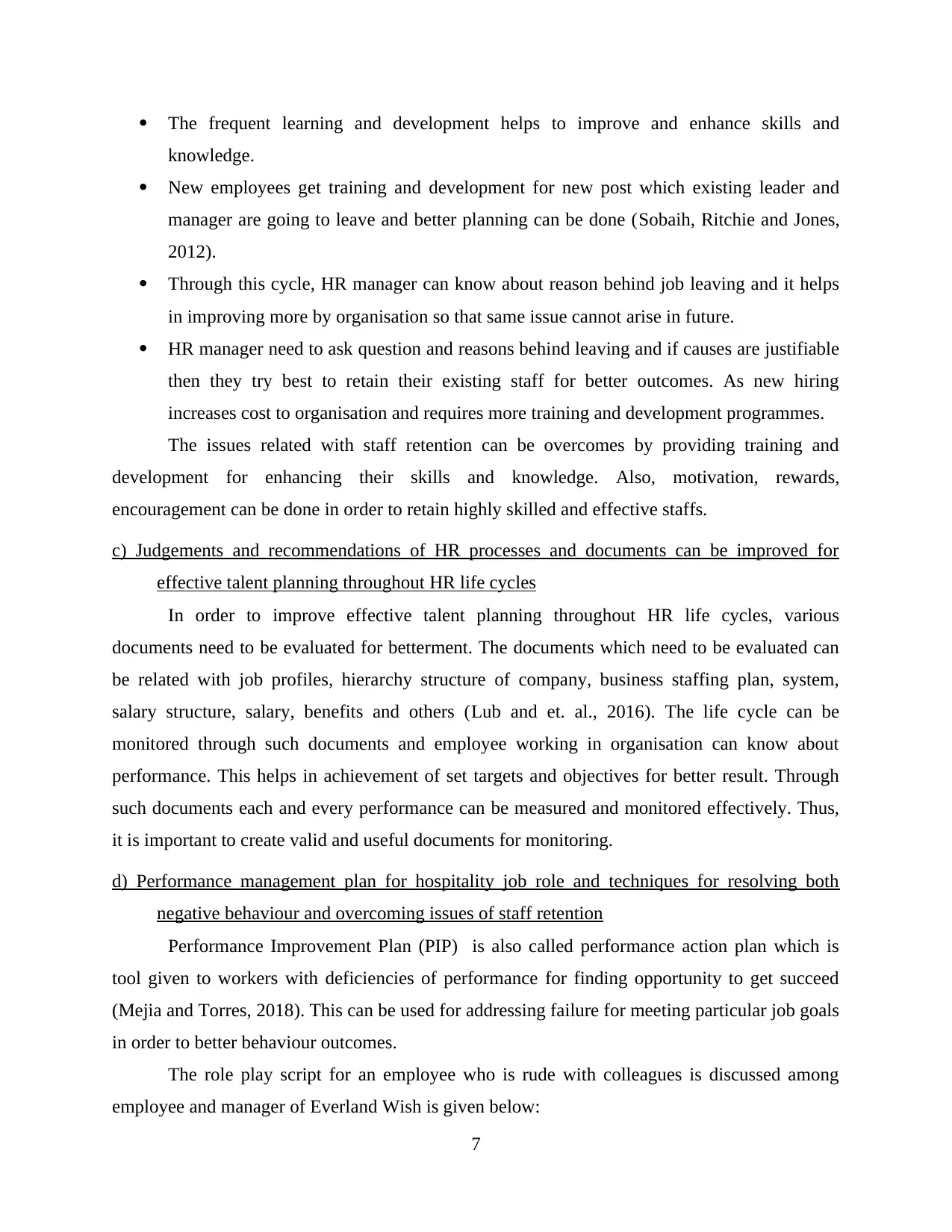
The frequent learning and development helps to improve and enhance skills and
knowledge.
New employees get training and development for new post which existing leader and
manager are going to leave and better planning can be done (Sobaih, Ritchie and Jones,
2012).
Through this cycle, HR manager can know about reason behind job leaving and it helps
in improving more by organisation so that same issue cannot arise in future.
HR manager need to ask question and reasons behind leaving and if causes are justifiable
then they try best to retain their existing staff for better outcomes. As new hiring
increases cost to organisation and requires more training and development programmes.
The issues related with staff retention can be overcomes by providing training and
development for enhancing their skills and knowledge. Also, motivation, rewards,
encouragement can be done in order to retain highly skilled and effective staffs.
c) Judgements and recommendations of HR processes and documents can be improved for
effective talent planning throughout HR life cycles
In order to improve effective talent planning throughout HR life cycles, various
documents need to be evaluated for betterment. The documents which need to be evaluated can
be related with job profiles, hierarchy structure of company, business staffing plan, system,
salary structure, salary, benefits and others (Lub and et. al., 2016). The life cycle can be
monitored through such documents and employee working in organisation can know about
performance. This helps in achievement of set targets and objectives for better result. Through
such documents each and every performance can be measured and monitored effectively. Thus,
it is important to create valid and useful documents for monitoring.
d) Performance management plan for hospitality job role and techniques for resolving both
negative behaviour and overcoming issues of staff retention
Performance Improvement Plan (PIP) is also called performance action plan which is
tool given to workers with deficiencies of performance for finding opportunity to get succeed
(Mejia and Torres, 2018). This can be used for addressing failure for meeting particular job goals
in order to better behaviour outcomes.
The role play script for an employee who is rude with colleagues is discussed among
employee and manager of Everland Wish is given below:
7
knowledge.
New employees get training and development for new post which existing leader and
manager are going to leave and better planning can be done (Sobaih, Ritchie and Jones,
2012).
Through this cycle, HR manager can know about reason behind job leaving and it helps
in improving more by organisation so that same issue cannot arise in future.
HR manager need to ask question and reasons behind leaving and if causes are justifiable
then they try best to retain their existing staff for better outcomes. As new hiring
increases cost to organisation and requires more training and development programmes.
The issues related with staff retention can be overcomes by providing training and
development for enhancing their skills and knowledge. Also, motivation, rewards,
encouragement can be done in order to retain highly skilled and effective staffs.
c) Judgements and recommendations of HR processes and documents can be improved for
effective talent planning throughout HR life cycles
In order to improve effective talent planning throughout HR life cycles, various
documents need to be evaluated for betterment. The documents which need to be evaluated can
be related with job profiles, hierarchy structure of company, business staffing plan, system,
salary structure, salary, benefits and others (Lub and et. al., 2016). The life cycle can be
monitored through such documents and employee working in organisation can know about
performance. This helps in achievement of set targets and objectives for better result. Through
such documents each and every performance can be measured and monitored effectively. Thus,
it is important to create valid and useful documents for monitoring.
d) Performance management plan for hospitality job role and techniques for resolving both
negative behaviour and overcoming issues of staff retention
Performance Improvement Plan (PIP) is also called performance action plan which is
tool given to workers with deficiencies of performance for finding opportunity to get succeed
(Mejia and Torres, 2018). This can be used for addressing failure for meeting particular job goals
in order to better behaviour outcomes.
The role play script for an employee who is rude with colleagues is discussed among
employee and manager of Everland Wish is given below:
7
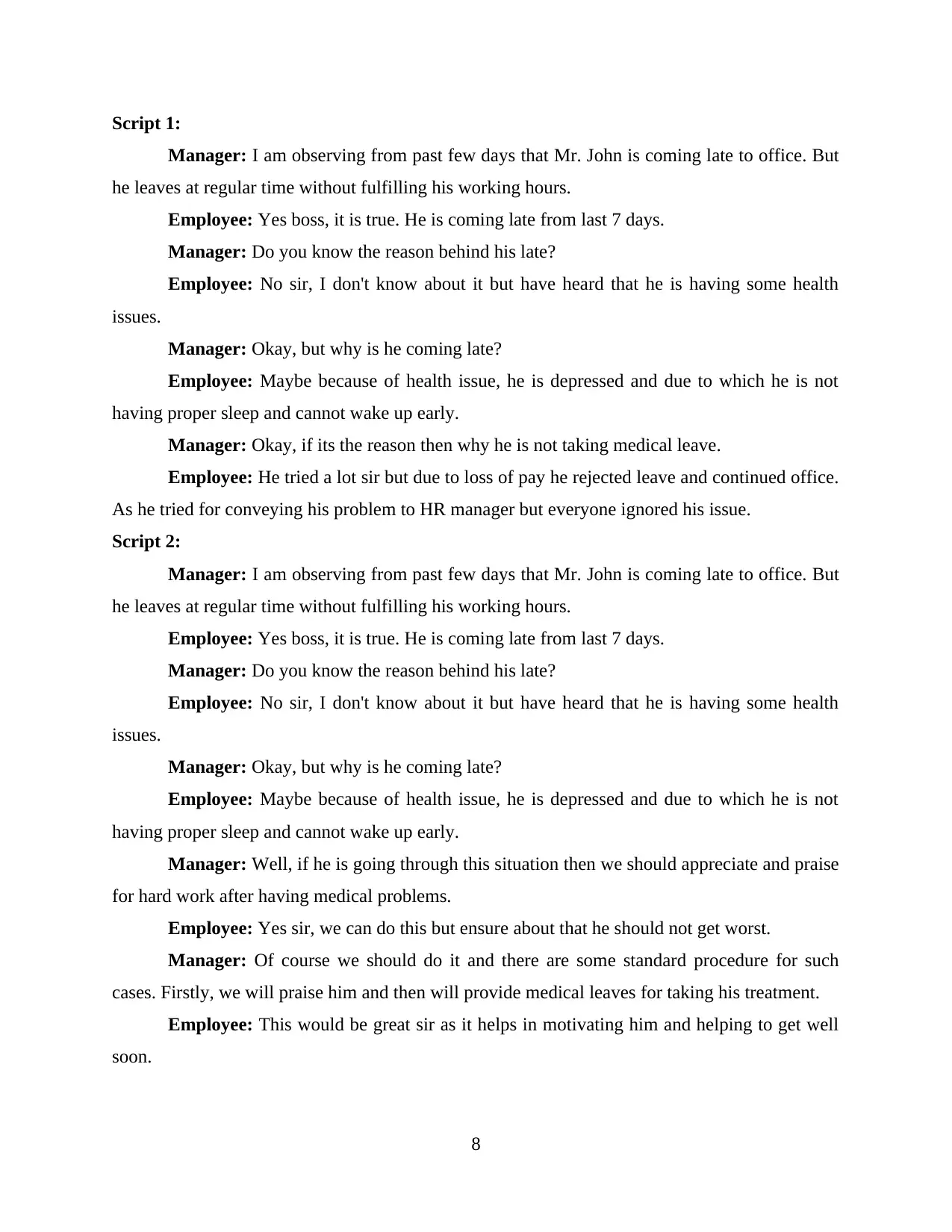
Script 1:
Manager: I am observing from past few days that Mr. John is coming late to office. But
he leaves at regular time without fulfilling his working hours.
Employee: Yes boss, it is true. He is coming late from last 7 days.
Manager: Do you know the reason behind his late?
Employee: No sir, I don't know about it but have heard that he is having some health
issues.
Manager: Okay, but why is he coming late?
Employee: Maybe because of health issue, he is depressed and due to which he is not
having proper sleep and cannot wake up early.
Manager: Okay, if its the reason then why he is not taking medical leave.
Employee: He tried a lot sir but due to loss of pay he rejected leave and continued office.
As he tried for conveying his problem to HR manager but everyone ignored his issue.
Script 2:
Manager: I am observing from past few days that Mr. John is coming late to office. But
he leaves at regular time without fulfilling his working hours.
Employee: Yes boss, it is true. He is coming late from last 7 days.
Manager: Do you know the reason behind his late?
Employee: No sir, I don't know about it but have heard that he is having some health
issues.
Manager: Okay, but why is he coming late?
Employee: Maybe because of health issue, he is depressed and due to which he is not
having proper sleep and cannot wake up early.
Manager: Well, if he is going through this situation then we should appreciate and praise
for hard work after having medical problems.
Employee: Yes sir, we can do this but ensure about that he should not get worst.
Manager: Of course we should do it and there are some standard procedure for such
cases. Firstly, we will praise him and then will provide medical leaves for taking his treatment.
Employee: This would be great sir as it helps in motivating him and helping to get well
soon.
8
Manager: I am observing from past few days that Mr. John is coming late to office. But
he leaves at regular time without fulfilling his working hours.
Employee: Yes boss, it is true. He is coming late from last 7 days.
Manager: Do you know the reason behind his late?
Employee: No sir, I don't know about it but have heard that he is having some health
issues.
Manager: Okay, but why is he coming late?
Employee: Maybe because of health issue, he is depressed and due to which he is not
having proper sleep and cannot wake up early.
Manager: Okay, if its the reason then why he is not taking medical leave.
Employee: He tried a lot sir but due to loss of pay he rejected leave and continued office.
As he tried for conveying his problem to HR manager but everyone ignored his issue.
Script 2:
Manager: I am observing from past few days that Mr. John is coming late to office. But
he leaves at regular time without fulfilling his working hours.
Employee: Yes boss, it is true. He is coming late from last 7 days.
Manager: Do you know the reason behind his late?
Employee: No sir, I don't know about it but have heard that he is having some health
issues.
Manager: Okay, but why is he coming late?
Employee: Maybe because of health issue, he is depressed and due to which he is not
having proper sleep and cannot wake up early.
Manager: Well, if he is going through this situation then we should appreciate and praise
for hard work after having medical problems.
Employee: Yes sir, we can do this but ensure about that he should not get worst.
Manager: Of course we should do it and there are some standard procedure for such
cases. Firstly, we will praise him and then will provide medical leaves for taking his treatment.
Employee: This would be great sir as it helps in motivating him and helping to get well
soon.
8
⊘ This is a preview!⊘
Do you want full access?
Subscribe today to unlock all pages.

Trusted by 1+ million students worldwide
1 out of 20
Related Documents
Your All-in-One AI-Powered Toolkit for Academic Success.
+13062052269
info@desklib.com
Available 24*7 on WhatsApp / Email
![[object Object]](/_next/static/media/star-bottom.7253800d.svg)
Unlock your academic potential
Copyright © 2020–2026 A2Z Services. All Rights Reserved. Developed and managed by ZUCOL.





